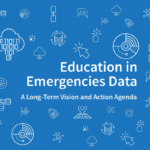As a first-generation, low-income woman PhD student, I recognized aspects of PhD programs that seemed to benefit students from privileged backgrounds, so I wanted to investigate if there are theories that can explain the students’ different experiences. This blog post highlights a forthcoming research article co-authored with David Rehfeld, Terrill Saxon, and Ariel Steele soon to be published in Opportunity Matters. Titled “Representation has changed: The need to update graduate student development theory to reflect marginalized populations’ experiences in the PhD,” the article discusses two bodies of literature. One looks at the challenges and strengths students from historically marginalized populations experience while in their PhD program, and the other considers theoretical frameworks that describe PhD students’ experiences and development while pursuing their program.
In this post, I describe the methodology we used in this research, share the results of the literature comparison, and highlight key implications.
Background
One avenue to understand these disparities is to examine what challenges or support graduate students have while pursuing their graduate degree program. Based on multiple studies, researchers have summarized the relevant literature for a holistic understanding of what helps graduate students complete their program – sometimes referred to as graduate student development frameworks. These frameworks guide program directors and other practitioners on policies and structures that help retain students.
Unfortunately, the existing educational development theoretical frameworks we explored in our literature comparison fail to incorporate the experiences of marginalized groups, often claiming PhD student success relies on individual factors rather than systemic issues.
Methodology
To identify relevant research, we conducted two separate literature reviews. For each, we used academic databases (ERIC, Education Research Complete, ProQuest Dissertations) and Google Scholar to search for terms related to specific student groups such as “first-generation PhD students,” and theories such as “PhD framework,” and “graduate education theory.” We also identified frameworks from our own research studies that focused on PhD student success. Only theories that described the entire PhD process were included; those that explained only specific years of the PhD program, such as entry or dissertation stage, were excluded. Additionally, studies or frameworks that focus only on specific PhD disciplines were excluded to provide a more holistic perspective on the PhD experience.
We then compared each article pertaining to the experiences of specific student groups from our population of focus to the theoretical graduate education models to identify if and where students’ identities and backgrounds were considered. We wrote up the results from each comparison according to student group and theory, and then examined collectively to understand the larger implications of how theories do and do not align with the experiences of marginalized student groups.
Results
Unfortunately, our research confirms that the current theories on graduate students’ development do not address these systemic issues. For instance, one of the earliest graduate theories includes “student background” as a factor influencing completion but does not account for specific characteristics (Tinto, 1993). Similarly, more recent theories, such as Gardner’s (2009) model of graduate student development, do not include particular student characteristics but do emphasize the need to account for the diversity of graduate students’ experiences. This lack of including a wide range of student characteristics may be due to the samples used to create these models, where the majority of PhD students identified as white, while a limited number of model development studies have prioritized the collection of other identity variables such as sexual orientation or class.
To our knowledge, the only graduate theoretical model that acknowledges systemic issues is Sallee’s gender socialization theory specific to doctoral students (2011; 2014). In this context, socialization refers to the ways that doctoral students are taught to become a part of their specific discipline or field. This socialization requires new knowledge, behavior, and expectations that align with others in the same field. PhD students must learn the culture and ways of their field, with geologists, historians, and psychologists all having a PhD but leaving their doctoral program with unique perspectives and priorities that come from the experts who came before them. Sallee argues that women are socialized within their field in a way that interacts with gender but that all fields highlight the priority of the masculine norms. Thus, women PhD students must take on the masculine norms of competition, hierarchy. and objectification of other women through the lens of their discipline in order to be deemed successful.
Despite the limited number of graduate-specific frameworks that address systemic issues, other studies on PhD students use broader theoretical frameworks. These include a model based on Critical Race Theory that highlights the strengths that marginalized groups bring to their settings, feminist theories, and Bourdieu’s social reproduction theory (1986) that describes how class impacts success through the accumulation of various forms of capital. While it is beneficial to acknowledge these systems, we recommend researchers begin developing PhD-specific frameworks with class, race, gender, and other identities within them to help uncover how these issues come together to impact graduate education and success therein.
Implications
- Acknowledge the systems of oppression at play within the state, university and graduate program as well as integrate structural supports to help students succeed: In the United States, racism, classism, sexism, and discrimination are pervasive and take many forms. Practitioners should take the time to examine how policies, practices, structures and biases contribute barriers in relevant settings for historically marginalized students. At minimum, students should have identity-specific resources on campus to help ensure they are working in environments that address their unique needs. Supports should include local and virtual affinity groups, physical and mental health resources, as well as financial aid/fellowship opportunities.
- Ask graduate students what they need: Research has yet to present a holistic and inclusive model for the graduate student experience that reflects the diversity of students, and each program and institution have their own context that need to be considered. For example, HBCUs in the south would have vastly different cultures than that of a small, private institution in the north. Hiring an impartial third party to survey and interview students to understand the unique ways to support them can help get honest and actional data on PhD students’ experiences and perceived challenges.
- Highlight and reward the strengths that different groups bring to the program:In this post, we only acknowledged the challenges faced by various groups, but the complete research paper also includes the strengths that marginalized groups bring to the graduate programs in which they are enrolled. Honoring students’ contributions informally, such as through conversations, or formally, through awards, scholarships, and recognition in campus emails and publications can contribute to change the culture of society that views marginalized groups as something to be fixed.
Conclusion
This literature review of graduate students’ PhD experiences and theoretical frameworks of graduate education identified inconsistencies between the reality marginalized students face and the abstract ideas regarding doctoral student success. Graduate students are not a blank slate when they enter their PhD programs and acknowledging their distinct histories, contexts, needs and strengths can help address some of the inequities within graduate education.
Photo credit: rawpixel/Adobe Stock



